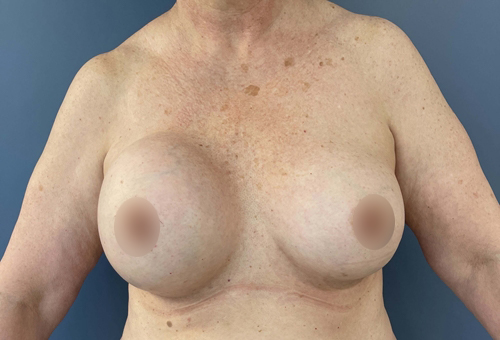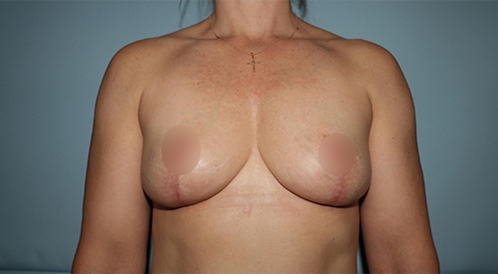Dr. Glenn Lyle is a board-certified plastic surgeon based in Raleigh, NC, known for his expertise in breast surgery and patient-centered care. With years of experience helping women make informed decisions about breast implants—whether it’s selecting the right type, addressing complications, or considering removal—Dr. Lyle remains a trusted resource throughout each stage of their journey. One topic he frequently discusses with patients is the increasingly popular but often misunderstood approach to implant removal known as en bloc capsulectomy.
Let’s start by saying that the decision to remove breast implants is deeply personal, and there’s no one-size-fits-all solution. If you’re feeling overwhelmed by conflicting information, you’re not alone. Dr. Lyle’s goal is to help you make an informed, confident decision that prioritizes your health and well-being.
Understanding En bloc Surgery
En bloc surgery has become somewhat of a buzzword in recent years. It’s a surgical technique where the implant and the surrounding scar tissue, or capsule as well a layer of normal tissue are removed in one intact piece. While this method is often recommended for certain medical conditions, it’s important to understand that it’s not necessary for everyone.
Many patients mistake total intact capsulectomy for en bloc. Total Intact capsulectomy refers to removing the implant and capsule in one piece . But normal tissue is not removed. It is an important distinction.
So, when is en bloc surgery the right choice? If you have a very rare case of cancer within the capsule such as a condition like breast implant-associated anaplastic large cell lymphoma (BIA-ALCL) or Breast Implant Associated Squamous Cell Cancer (BIA- SCC) an en bloc approach might be the safest and most effective option.
This technique follows standard oncological surgery principles of including normal tissue with the cancerous parts to avoid leaving cancer cells behind.. But for the vast majority of women, a less invasive procedure can achieve the same results with fewer risks .
So, what are the risks of en bloc surgery? Potential injury to surrounding tissue like nerves, blood vessels, ribs and even the underlying chest wall with entry into the lungs. Such damage can occur with aggressive en bloc surgery resulting in potential pain and deformity.
The vast majority of implant capsules do NOT harbor cancer. Total intact capsulectomy is indicated for ruptured implants to avoid allowing silicone from leaking into the tissues.
But even in those cases, sometimes it is impossible to remove the implant and capsule intact, so a controlled removal of the implant material is performed to allow safer removal of the entire capsule.
Why En bloc Surgery May Not Be Necessary for You
One of the most common misconceptions Dr. Lyle hears from patients is that en bloc surgery is the only way to safely remove implants. That’s simply not true. In many cases, other techniques, like partial capsulectomy or implant removal alone, are equally effective and come with added benefits.
Here’s why:
• It’s safer and less invasive. En bloc surgery often requires larger incisions and a more extensive surgical process, which can increase your recovery time and risk of complications.
• Healthy capsules don’t need to go. If the scar tissue around your implant is thin, healthy, and not causing any issues, there’s no medical reason to remove it entirely.
• Your care should be tailored to you. Every patient’s situation is unique, and the best approach is one that’s designed specifically for your needs and goals. As Dr. Lyle often say, “Every patient’s journey is unique, and the surgical approach should reflect their specific needs and goals.”

Meet Dr. Glenn Lyle
Board Certified Plastic Surgeon
Dr. Glenn Lyle, a board-certified plastic surgeon, has been proudly serving the Raleigh, NC, community at Lyle Plastic Surgery and Aesthetics Center since 2002. With a deep passion for helping patients reclaim their confidence, Dr. Lyle specializes in transformative breast surgery and body contouring procedures. Whether addressing the effects of weight loss, pregnancy, or aging, his expert care and artistic approach empower individuals to look and feel their best. Dr. Lyle is dedicated to creating beautiful, natural results that reflect each patient’s personal journey and goals.
Weighing the Risks and Benefits
When Dr Glenn Lyle sits down with patients, he always makes it a point to talk through the pros and cons of each surgical option. He wants you to feel empowered in your decision. Here are a few things to keep in mind:
The risks of en bloc surgery:
While effective in specific cases, it’s a more complex surgery that may lead to a longer recovery and increased risk of bleeding or scarring.
The benefits of alternative implant removal methods: Techniques like partial capsulectomy can achieve the same results in many cases, but with smaller incisions, less downtime, and a faster recovery.
Dos and Don’ts for Pre- and Post-Surgery Care after Breast Implant Removal Surgery
Do’s:
Follow Dr. Lyle’s pre-operative instructions, such as stopping certain medications or supplements.
Arrange for someone to drive you home and assist you during the first 24 hours post-surgery.
Keep the surgical site clean and follow wound care instructions meticulously.
Maintain open communication with Dr. Lyle about any concerns during recovery.
Don’ts:
Don’t engage in strenuous activities or heay lifting until cleared by Dr. Lyle.
Avoid smoking, as it can impede healing and increase risks of complications.
Refrain from applying any creams or ointments to the incision site without your surgeon’s approval.
Don’t skip follow-up appointments – they are crucial for monitoring your recovery.
Breast Implant Removal in Raleigh NC
In Raleigh, NC, Dr. Lyle has noticed a growing awareness among women about personalized surgical options. Patients here tend to be proactive in seeking minimally invasive techniques and appreciate an evidence-based approach.
Dr. Lyle’s role is to balance these preferences with the best medical practices to ensure safe, effective outcomes.
Breast Implant Removal Before and After Photos
Advice for Different Patients
Younger Patients: Women in their 20s and 30s often prioritize quicker recovery times and minimal scarring. For these patients, techniques like partial capsulectomy are particularly appealing.
Older Patients: Women in their 50s and 60s may have different health considerations, such as underlying medical conditions, that make a less invasive approach safer and more practical.
Preparing for Your Consultation
The consultation is your opportunity to explore your options and get answers to your questions. Here are a few tips to make the most of it:
Come prepared. Bring your medical history, surgical records and implant details, and a list of any symptoms you’ve been experiencing.
Ask the right questions. Make sure you understand why a particular surgical method is being recommended for you.
Review before-and-after photos. Seeing real-life results can help you feel more confident about what to expect. Should you consider removal only or removal with a breast lift?
Dr. Lyle always encourages his patients to take their time and never feel rushed into a decision. This is your body, your health, and your future – it’s worth getting it right.
My Perspective as a Surgeon
As a plastic surgeon, Dr. Lyle views every procedure as a balance of art and science. His role isn’t just to address your medical concerns but also to ensure you feel beautiful, confident, and empowered. Whether it’s breast implant removal or scar revision, his goal is to create results that feel natural and true for you.
Next Steps
If you’re considering breast implant removal, the first step is to schedule a consultation. During your meeting, you will discuss your goals, evaluate your options, and develop a plan that’s tailored just for you. It’s a journey, but you don’t have to go through it alone. Dr. Glenn Lyle will be with you every step of the way.
You’ll work together to find the right solution for you. Whether that’s en bloc surgery, partial capsulectomy, or implant removal alone, Dr. Lyle’s focus is always on your safety, satisfaction, and long-term health.
You deserve to feel confident and comfortable in your body. Let’s make that happen.
FAQS about Why You Don’t Need an En bloc Surgery for Breast Implant Removal
What is en bloc surgery, and how does it differ from other implant removal techniques?
En bloc surgery involves removing the implant and surrounding capsule as well as a layer of normal tissue in one intact unit. Total intact capsulectomy does not attempt to remove a rim of normal tissue but sometimes some does get removed. Other techniques, like partial capsulectomy, may involve removing only part of the capsule.
When is en bloc surgery absolutely necessary?
En bloc surgery is typically required for rare conditions like BIA-ALCL or BIA-SCC. Total intact capsulectomy or total capsulectomy usually is reserved for ruptured implants with significant encapsulation and when the silicone becomes embedded in the capsule.
Can a less invasive approach achieve the same results?
Yes, in many cases, partial capsulectomy or implant removal alone can effectively address patient concerns with fewer risks.
What are the risks associated with en bloc surgery?
Risks include larger incisions, prolonged recovery time, and increased chances of bleeding or scarring compared to less invasive methods.
How do I know which procedure is right for me?
The best approach depends on your individual health, the condition of your implants, and your personal goals. A consultation with a qualified surgeon can help determine the most appropriate option.
Will removing my implants improve symptoms like fatigue or pain?
Many patients report symptom improvement after implant removal, but it’s essential to discuss expectations and possible outcomes with your surgeon.
How can I prepare for my implant removal surgery?
Preparation includes gathering medical records, understanding the procedure and recovery process, and discussing your goals and concerns with your surgeon.
Medical References
- Challenges in the Management of Patients Requesting “En-Bloc” Capsulectomy. National Institutes of Health – PMC. https://pmc.ncbi.nlm.nih.gov/articles/PMC7427144/
- Breast Implant Rupture. StatPearls – NCBI Bookshelf. https://www.ncbi.nlm.nih.gov/books/NBK459308/
- En Bloc vs Partial Capsulectomy for Breast Implant Removal. Centre for Surgery – UK. https://centreforsurgery.com/en-bloc-vs-partial-capsulectomy-for-breast-implant-removal/
- What Are My Options Following Breast Implant Removal? Centre for Surgery – UK. https://centreforsurgery.com/what-are-my-options-following-breast-implant-removal/
- Breast Implant Illness: A Review of the Literature. National Institutes of Health – PMC. https://www.ncbi.nlm.nih.gov/pmc/articles/PMC7427144/
Further Reading
Read Dr Glenn Lyle’s blog on Top 5 Reasons for Breast Implant Removal in North Carolina
Read Dr Glenn Lyle’s blog on Explantation/Mastopexy with tummy tuck; Mommy Makeover Variation in Raleigh
Read Dr Glenn Lyle’s blog on Breast Explantation Surgeons – use Caution!
Read Dr Glenn Lyle’s blog on All Explants Are Not the Same
Read Dr Glenn Lyle’s blog on Considerations for Breast Implant Removal After Weight Loss
Read Dr Glenn Lyle’s blog on Breast Explantation Surgeons – use Caution!





